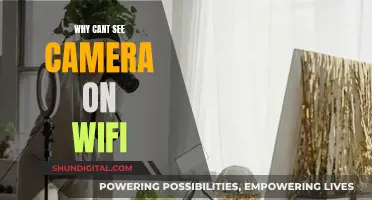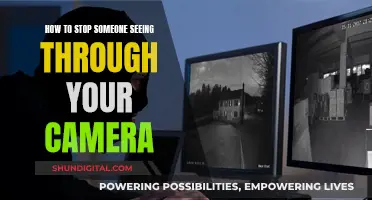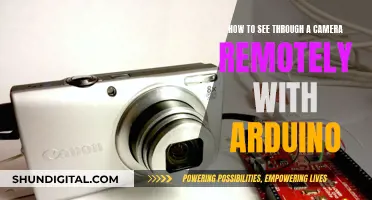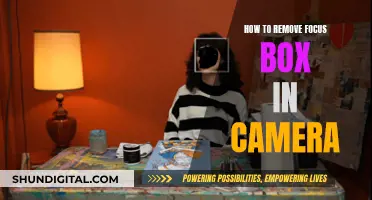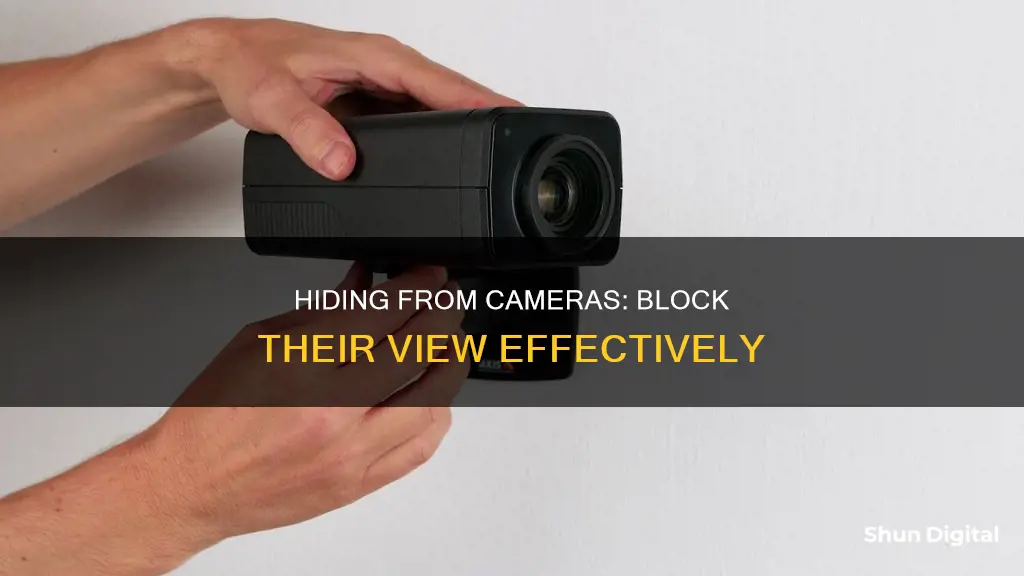
There are many reasons why you may want to block a camera from seeing you. Security cameras, for example, can be used to protect your property from intruders, but they can also be used to invade your privacy. If you feel that a camera is violating your privacy, it is important to understand the local laws regarding the installation of surveillance cameras before taking any action. Directly damaging or tampering with a camera can be considered vandalism and lead to legal problems. Instead, there are several gentle and legal ways to protect your privacy. One way is to talk to the camera owner and express your concerns. Another way is to use natural barriers, such as trees, fences, or curtains, to block the camera's view. You can also seek help from mediators or legal professionals if needed.
| Characteristics | Values |
|---|---|
| Communicate with the camera owner | Politely ask them to adjust the camera angle or change its position to respect your privacy |
| Check if the camera is real | Fake security cameras are often used as a deterrent and can be identified by a flashing red light at night |
| Confirm blind spots | Pay attention to the daily movement of the camera and check if it has PTZ functions, as cameras without PTZ functions have larger blind spots |
| Seek help from mediators | Local community justice or neighbourhood mediation centres can help mediate a meeting to settle the problem |
| Block the camera with objects | Use tall trees, fences, curtains, hedges, trellises with climbing plants, privacy screens, or reflective materials to block the camera's line of sight |
| Put objects to confuse cameras | Install moving objects such as flags or windmills that will be detected by motion sensors, potentially causing the camera owner to disable motion detection |
| Use infrared light sources | Strategically place IR lights or floodlights to create areas of high IR intensity that overwhelm the camera's sensor |
| Use anti-reflective coatings | Apply anti-reflective coatings or films on windows or surfaces facing the camera to reduce glare and reflections |
| Use privacy films and tinting | Install privacy films or tinting on windows to obscure the view while maintaining visibility from inside |
| Install your own security camera | Installing a security camera on your property may serve as a warning to the other person |
| Consult a lawyer or the police | If the camera is recording your property, consult a lawyer or the police as this may be considered an invasion of privacy |
What You'll Learn

Talk to the camera owner
If you are concerned about a camera invading your privacy, the best first step is to talk to the camera owner.
Research the laws and regulations in your area
Before you approach the camera owner, it is a good idea to understand the relevant laws and regulations in your area. In many places, there are specific rules about where cameras can be pointed and what can be recorded. Understanding these laws can help guide your conversation and any further actions you may need to take.
Open communication
Open communication is always the best way to solve problems. Talk to the camera owner about your concerns regarding their security camera capturing your property. They may not have realised the angle of their camera and may be willing to adjust it to respect your privacy.
Be polite and explain your concerns
Explain to the camera owner that the direction and installation of their camera make you feel uncomfortable. Politely ask them to change the pointing direction of the camera, change its position, or remove it. Most people don't want to be jerks, and the owner may not realise how uncomfortable their camera is making you.
Offer a compromise
Let the camera owner know that you want to come to a compromise that makes everyone happy. If the camera owner is a reasonable person, this might be all you need to do.
Seek help from a mediator
If you have an unreasonable neighbour and your talk ends in failure, seeking help from a mediator may be useful. You can go to your local community justice or neighbourhood mediation centre and explain your needs. They can mediate a meeting between you and your neighbour to settle the problem without further escalation.
Smart TVs: Cameras and Your Privacy
You may want to see also

Use natural barriers like trees and shrubs
If you're looking to block a camera's view using natural barriers like trees and shrubs, there are a few things to consider. Firstly, you'll want to choose plants that provide year-round coverage and grow to an appropriate height. This might include fast-growing columnar evergreens such as Italian cypress and arborvitae, or a sheared privet hedge for a more manicured look. To ensure year-round coverage, you can create a layered planting scheme, combining deciduous and evergreen trees, shrubs, and perennials. Stagger the evergreens in the background and step down the height with deciduous trees in the foreground to provide texture, depth, and colour.
When planting, it's important to space individual shrubs about 12 inches apart and bring the soil up to the branching trunk. Watering them deeply and frequently, especially during the first year, is crucial for their growth and survival. You can also incorporate climbing plants onto a trellis or fence to add texture and colour to the natural barrier.
For a more movable option, consider container gardens with potted plants such as arborvitae or clumping bamboo, which can be strategically placed to form a green screen. Choose lightweight containers that can be easily rearranged if needed.
If planting trees or shrubs isn't feasible, you could also consider other natural barriers such as tall hedges or trellises with climbing plants. These options can create effective visual barriers without completely blocking airflow or sunlight.
Unraveling the Mystery of Person, Woman, Man, Camera, TV
You may want to see also

Install privacy fences or screens
If you are looking for ways to block a camera's view, one of the most effective methods is to install a privacy fence or screen. This physical barrier can block the camera's view of your house or property. Here are some detailed instructions and considerations to help you install privacy fences or screens effectively:
Understand Local Regulations:
Before installing a privacy fence or screen, it is crucial to familiarize yourself with the local regulations and guidelines. Different areas may have specific rules regarding the placement and height of fences or screens. Make sure your installation complies with these regulations and does not infringe on any property rights.
Choose the Right Materials:
Privacy fences and screens come in various materials, such as wood, vinyl, metal, or a combination of materials. Consider factors such as durability, maintenance, and aesthetics when selecting the material that best suits your needs and preferences.
Determine the Optimal Location:
Strategically place your privacy fence or screen along the property line to maximize its effectiveness in blocking the camera's view. Consider the camera's position and angle to identify the areas where the fence or screen will provide the best coverage.
Ensure Proper Installation:
Whether you're installing a fence or screen, proper installation is essential. If you're hiring professionals, ensure they have the necessary skills and experience. If you're taking the DIY route, carefully follow the manufacturer's instructions and use the appropriate tools and techniques to ensure a secure and long-lasting installation.
Maintain and Inspect Regularly:
Once your privacy fence or screen is installed, maintain it properly to ensure its longevity. Clean and inspect it regularly for any signs of damage or wear and tear. Address any issues promptly to keep the barrier effective and aesthetically pleasing.
Remember, while installing privacy fences or screens can be a great way to block a camera's view, it is always important to respect others' property and follow local regulations. Open communication with your neighbours about any concerns can often lead to amicable solutions without the need for drastic measures.
Is My Camera Watching Me?
You may want to see also

Use infrared light sources to overwhelm the camera's sensor
To block a camera from seeing you, you can use infrared (IR) light sources to overwhelm the camera's sensor. IR light is invisible to the human eye but can be detected by cameras. By pointing IR lights or illuminators directly at security cameras, you can prevent them from capturing any images during the night.
Most security cameras use IR sensors for night vision, so you can strategically place IR lights or floodlights around your property to create areas of high IR intensity. This will cause overexposure or washout in the footage, effectively blocking the camera's view. However, it's important to be mindful of local regulations regarding light pollution and excessive brightness, as well as the potential for strong IR lights to cause damage to cameras.
The key to success with this method is to ensure that the IR lights are pointed directly at the camera and that the intensity is high enough to overwhelm the sensor without causing damage. This technique can be particularly effective when combined with other methods, such as using natural barriers like trees or fences to block the camera's view.
Additionally, it's worth noting that while this method can be useful for blocking cameras at night, it may not work as well during the day, especially with higher-end cameras that have IR filters or use other forms of night vision.
Smart TV Camera: Where is it Located?
You may want to see also

Use anti-reflective coatings on windows
Applying anti-reflective coatings to your windows is an effective way to protect your privacy and prevent cameras from seeing you. These coatings are designed to reduce glare and reflections, making it difficult for cameras to capture clear images of your home's interior or your property.
Anti-reflective coatings, also known as anti-glare window films, are a type of sun control film that helps eliminate excess sunlight and glare while still allowing natural light to pass through. They are effective immediately after installation and can reduce glare by up to 95%. One of the key advantages of these coatings is their ability to filter out up to 99% of harmful UV rays, which not only protects your skin but also prevents fading in furnishings and upholstery.
When choosing an anti-reflective coating, look for non-metallic options that provide clarity without distorting your view from the inside. These coatings are designed with multiple thin layers of film that enable precise control of light, reflecting certain wavelengths while allowing others to pass through. This technology ensures that you can still enjoy the sunlight and your view while maintaining your privacy.
The installation process for anti-reflective coatings is straightforward and can be done by professional installers or even as a DIY project. The average price for window film ranges from $10 to $800, making it a cost-effective solution for enhancing your privacy.
By applying anti-reflective coatings to your windows, you can rest assured that you are taking a legal and appropriate step to protect your privacy without causing any damage or obstruction to your neighbour's security cameras.
The Camera's Eye: Watching You, Watching It
You may want to see also
Frequently asked questions
The best way to block a camera from seeing you is to use natural barriers such as trees, fences, blinds, or curtains.
You can also use infrared light sources to overwhelm the camera's sensor, or apply anti-reflective coatings or privacy films to windows to obscure the view.
If someone is invading your privacy with a camera, you should first try talking to them politely and asking them to adjust the camera angle or direction. If that doesn't work, you can seek help from mediators or local community services.
You should avoid doing anything illegal or destructive, such as damaging the camera, hacking into it, or using camera jammers, as this can lead to legal problems.


